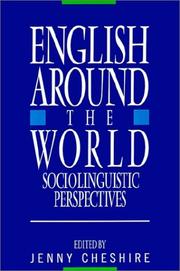| Listing 1 - 1 of 1 |
Sort by
|

ISBN: 0521395658 0521330807 1316039250 0511611889 9780521395656 Year: 1991 Publisher: Cambridge Cambridge University press
Abstract | Keywords | Export | Availability | Bookmark
 Loading...
Loading...Choose an application
- Reference Manager
- EndNote
- RefWorks (Direct export to RefWorks)
Only a few centuries ago the English language consisted of a collection of dialects spoken mainly by monolinguals and only within the shores of a small island. Now the English language includes such typologically distinct varieties as pidgins and creoles, 'new' Englishes, and a range of different standard and nonstandard varieties that are spoken on a regular basis in many different countries throughout the world. English is also, of course, the main language used for communication at an international level. The use of English in such a diverse range of social contexts around the world provides us with a unique opportunity to analyse and document the linguistic variation and change that is occurring within a single language, on a far greater scale - as far as we know - than has ever happened in the world's linguistic history before. This volume is intended to give a comprehensive account of our current knowledge of variation in the use of the English language around the world. Overview papers, written by specialist authors, survey the social context in which English is spoken in those parts of the world where it is widely used. Case study papers then provide representative examples of the empirical research that has been carried out into the English that is spoken in that part of the world. The volume therefore contributes both to our understanding of the English language worldwide and to a more general understanding of language as it is used in its social context. It assesses the extent of our current knowledge of variation in the English language and points to gaps in our understanding which future research might set out to remedy.
Sociolinguistics --- English language --- Dialectology --- Langue anglaise --- --Sociolinguistique --- --Dialecte --- --English language --- Dialects --- Variation --- Social aspects --- Language and languages --- Language and society --- Society and language --- Sociology of language --- Language and culture --- Linguistics --- Sociology --- Integrational linguistics (Oxford school) --- English language in foreign countries --- World Englishes --- Sociological aspects --- Foreign countries --- Arts and Humanities --- Language & Linguistics --- Sociolinguistics. --- Germanic languages --- Dialects. --- Variation. --- Social aspects. --- Sociolinguistique --- Dialecte --- English language - Dialects --- English language - Variation --- English language - Social aspects --- English language - Foreign countries --- ANGLAIS (LANGUE) --- Anglais (langue) --- SOCIOLINGUISTIQUE --- DIALECTES --- ASPECT SOCIAL --- A L'ETRANGER
| Listing 1 - 1 of 1 |
Sort by
|

 Search
Search Feedback
Feedback About
About Help
Help News
News